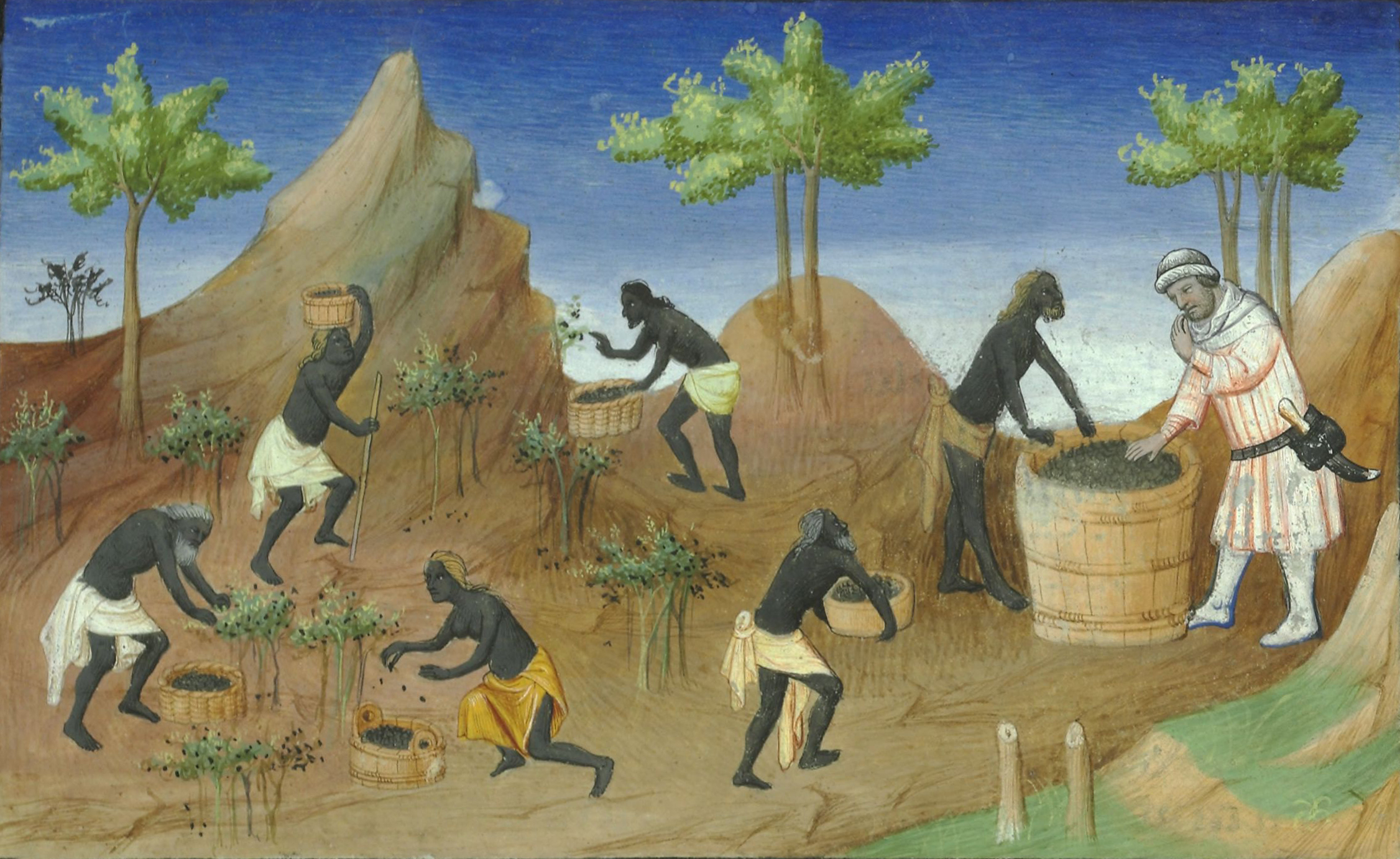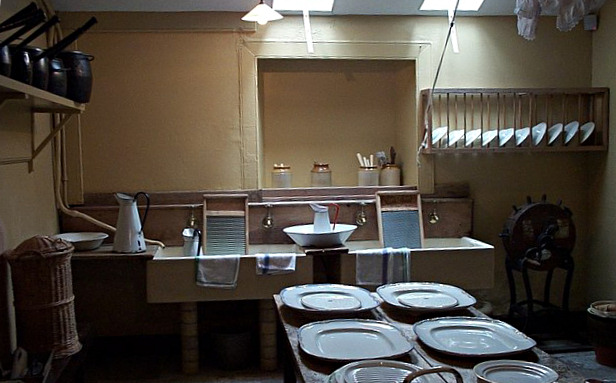|
Spicery
A spicery was the office in a medieval or Renaissance household responsible for spices, as well as the room in which the spices were kept. It was headed by a spicerer. The office was subordinated to the kitchen or the wardrobe, and existed as a separate office only in larger households. It was closely connected with other offices of the kitchen, such as the saucery and the scullery. The term is largely obsolete today, and if used at all is more often simply a synonym A synonym is a word, morpheme, or phrase that means exactly or nearly the same as another word, morpheme, or phrase in a given language. For example, in the English language, the words ''begin'', ''start'', ''commence'', and ''initiate'' are all ... for spices. References Medieval cuisine {{condiment-stub ... [...More Info...] [...Related Items...] OR: [Wikipedia] [Google] [Baidu] |
Middle Ages
In the history of Europe, the Middle Ages or medieval period lasted approximately from the late 5th to the late 15th centuries, similar to the post-classical period of global history. It began with the fall of the Western Roman Empire and transitioned into the Renaissance and the Age of Discovery. The Middle Ages is the middle period of the three traditional divisions of Western history: classical antiquity, the medieval period, and the modern period. The medieval period is itself subdivided into the Early, High, and Late Middle Ages. Population decline, counterurbanisation, the collapse of centralized authority, invasions, and mass migrations of tribes, which had begun in late antiquity, continued into the Early Middle Ages. The large-scale movements of the Migration Period, including various Germanic peoples, formed new kingdoms in what remained of the Western Roman Empire. In the 7th century, North Africa and the Middle East—most recently part of the Eastern Ro ... [...More Info...] [...Related Items...] OR: [Wikipedia] [Google] [Baidu] |
Renaissance
The Renaissance ( , ) , from , with the same meanings. is a period in European history marking the transition from the Middle Ages to modernity and covering the 15th and 16th centuries, characterized by an effort to revive and surpass ideas and achievements of classical antiquity. It occurred after the Crisis of the Late Middle Ages and was associated with great social change. In addition to the standard periodization, proponents of a "long Renaissance" may put its beginning in the 14th century and its end in the 17th century. The traditional view focuses more on the early modern aspects of the Renaissance and argues that it was a break from the past, but many historians today focus more on its medieval aspects and argue that it was an extension of the Middle Ages. However, the beginnings of the period – the early Renaissance of the 15th century and the Italian Proto-Renaissance from around 1250 or 1300 – overlap considerably with the Late Middle Ages, conventionally da ... [...More Info...] [...Related Items...] OR: [Wikipedia] [Google] [Baidu] |
Spice
A spice is a seed, fruit, root, bark, or other plant substance primarily used for flavoring or coloring food. Spices are distinguished from herbs, which are the leaves, flowers, or stems of plants used for flavoring or as a garnish. Spices are sometimes used in medicine, religious rituals, cosmetics or perfume production. For example, vanilla is commonly used as an ingredient in fragrance manufacturing. A spice may be available in several forms: fresh, whole dried, or pre-ground dried. Generally, spices are dried. Spices may be ground into a powder for convenience. A whole dried spice has the longest shelf life, so it can be purchased and stored in larger amounts, making it cheaper on a per-serving basis. A fresh spice, such as ginger, is usually more flavorful than its dried form, but fresh spices are more expensive and have a much shorter shelf life. Some spices are not always available either fresh or whole, for example turmeric, and often must be purchased in ground form. ... [...More Info...] [...Related Items...] OR: [Wikipedia] [Google] [Baidu] |
Kitchen
A kitchen is a room or part of a room used for cooking and food preparation in a dwelling or in a commercial establishment. A modern middle-class residential kitchen is typically equipped with a stove, a sink with hot and cold running water, a refrigerator, and worktops and kitchen cabinets arranged according to a modular design. Many households have a microwave oven, a dishwasher, and other electric appliances. The main functions of a kitchen are to store, prepare and cook food (and to complete related tasks such as dishwashing). The room or area may also be used for dining (or small meals such as breakfast), entertaining and laundry. The design and construction of kitchens is a huge market all over the world. Commercial kitchens are found in restaurants, cafeterias, hotels, hospitals, educational and workplace facilities, army barracks, and similar establishments. These kitchens are generally larger and equipped with bigger and more heavy-duty equipment than a residential ... [...More Info...] [...Related Items...] OR: [Wikipedia] [Google] [Baidu] |
Wardrobe (government)
The King's Wardrobe, together with the Chamberlain (office), Chamber, made up the personal part of Middle Ages, medieval England, English government known as the King's household. Originally the room where the king's clothes, armour, and treasure were stored, the term was expanded to describe both its contents and the department of clerks who ran it. Early in the reign of Henry III of England, Henry III the Wardrobe emerged out of the fragmentation of the ''Curia Regis'' to become the chief administrative and accounting department of the Household. The Wardrobe received regular block grants from the Exchequer for much of its history; in addition, however, the wardrobe treasure of gold and jewels enabled the king to make secret and rapid payments to fund his diplomatic and military operations, and for a time, in the 13th-14th centuries, it eclipsed the Exchequer as the chief spending department of central government. There were in fact two main Wardrobes for much of this period: aro ... [...More Info...] [...Related Items...] OR: [Wikipedia] [Google] [Baidu] |
Saucery
A saucery was the office in a medieval household responsible for sauces, as well as the room in which the preparation of sauces took place. It was headed by a saucerer. The office was subordinated to the kitchen, and existed as a separate office only in larger households. It was closely connected with other offices of the kitchen, such as the spicery and the scullery. The term is largely obsolete today. See also * Condiment * Sorcery (other) * Saucier A saucier () or sauté chef is a position in the classical brigade style kitchen. It can be translated into English as ''sauce chef''. In addition to preparing sauces, the saucier prepares stews, hot hors d'œuvres, and sautés food to order. ... References Medieval cuisine {{cuisine-stub ... [...More Info...] [...Related Items...] OR: [Wikipedia] [Google] [Baidu] |
Scullery (room)
A scullery is a room in a house, traditionally used for washing up dishes and laundering clothes, or as an overflow kitchen. Tasks performed in the scullery include cleaning dishes and cooking utensils (or storing them), occasional kitchen work, ironing, boiling water for cooking or bathing, and soaking and washing clothes. Sculleries contain hot and cold sinks, sometimes slop sinks, drain pipes, storage shelves, plate racks, a work table, various coppers for boiling water, tubs, and buckets. The term "scullery" has fallen into disuse in North America, as laundry takes place in a utility room or laundry room. The term continues in use in its original sense in Britain and Ireland amongst the middle classes, or as an alternative term for kitchen in some regions of Britain, typically Northern Ireland, North East England and Scotland, or in designer kitchens. In United States military facilities and most commercial restaurants, a "scullery" refers to the section of a dining facili ... [...More Info...] [...Related Items...] OR: [Wikipedia] [Google] [Baidu] |
Synonym
A synonym is a word, morpheme, or phrase that means exactly or nearly the same as another word, morpheme, or phrase in a given language. For example, in the English language, the words ''begin'', ''start'', ''commence'', and ''initiate'' are all synonyms of one another: they are ''synonymous''. The standard test for synonymy is substitution: one form can be replaced by another in a sentence without changing its meaning. Words are considered synonymous in only one particular sense: for example, ''long'' and ''extended'' in the context ''long time'' or ''extended time'' are synonymous, but ''long'' cannot be used in the phrase ''extended family''. Synonyms with exactly the same meaning share a seme or denotational sememe, whereas those with inexactly similar meanings share a broader denotational or connotational sememe and thus overlap within a semantic field. The former are sometimes called cognitive synonyms and the latter, near-synonyms, plesionyms or poecilonyms. Lexicograph ... [...More Info...] [...Related Items...] OR: [Wikipedia] [Google] [Baidu] |
Merriam-Webster
Merriam-Webster, Inc. is an American company that publishes reference books and is especially known for its dictionaries. It is the oldest dictionary publisher in the United States. In 1831, George and Charles Merriam founded the company as G & C Merriam Co. in Springfield, Massachusetts. In 1843, after Noah Webster died, the company bought the rights to ''An American Dictionary of the English Language'' from Webster's estate. All Merriam-Webster dictionaries trace their lineage to this source. In 1964, Encyclopædia Britannica, Inc. acquired Merriam-Webster, Inc. as a subsidiary. The company adopted its current name in 1982. History Noah Webster In 1806, Webster published his first dictionary, ''A Compendious Dictionary of the English Language''. In 1807 Webster started two decades of intensive work to expand his publication into a fully comprehensive dictionary, ''An American Dictionary of the English Language''. To help him trace the etymology of words, Webster learned ... [...More Info...] [...Related Items...] OR: [Wikipedia] [Google] [Baidu] |



_(7563655820).jpg)

